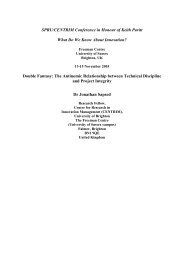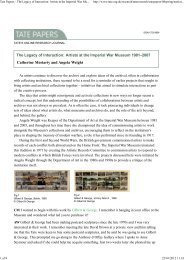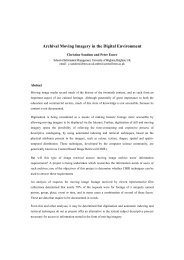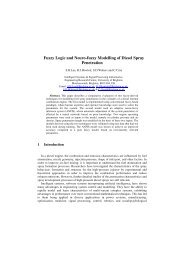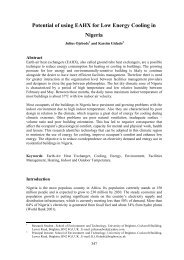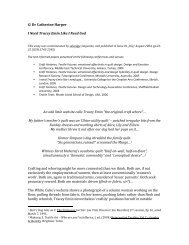NESTA Crime Online - University of Brighton Repository
NESTA Crime Online - University of Brighton Repository
NESTA Crime Online - University of Brighton Repository
You also want an ePaper? Increase the reach of your titles
YUMPU automatically turns print PDFs into web optimized ePapers that Google loves.
cybercrime activities takes place <strong>of</strong>fline, as well as a combination <strong>of</strong> online and <strong>of</strong>fline<br />
methods. Examples <strong>of</strong> these types <strong>of</strong> cybercriminal operations are captured in the<br />
sections below.<br />
2.3.1 Offline business models<br />
Although the Internet is a common meeting and workplace for cybercriminals, we have<br />
seen that some credit card fraud and ID theft still takes place in a traditional <strong>of</strong>fline<br />
fashion. These activities are usually higher risk, since they lack the anonymity <strong>of</strong> the<br />
Internet. However, they have provided an opportunity for traditional crime gangs to<br />
exploit the economic opportunities <strong>of</strong> cybercrime businesses benefiting from their<br />
existing structure, hierarchy and occasional funding from other illicit activities. Some <strong>of</strong><br />
the business models identified as a result are the loyalty business model and business<br />
process outsourcing.<br />
The loyalty business model is used in strategic management where company resources<br />
are employed to increase the loyalty <strong>of</strong> customers and other stakeholders to meet<br />
corporate expectations. Whilst supermarkets might use loyalty cards, organised crime<br />
groups may maintain the loyalty <strong>of</strong> gang members and the code <strong>of</strong> silence with cash<br />
‘incentives’ 214 or the threat <strong>of</strong> violence or extortion. These are at the root <strong>of</strong> the <strong>of</strong>fline<br />
criminal ecosystem, which requires more established criminal practices than online<br />
criminality, and are a reminder <strong>of</strong> the negative, dishonest and violent connotations that<br />
largely define this ecosystem.<br />
The business process outsourcing (BPO) involves contracting operations and<br />
responsibilities <strong>of</strong> specific business functions (or processes) to a third-party service<br />
provider. It is traditionally associated with large manufacturing firms outsourcing large<br />
segments <strong>of</strong> their supply chain. Today, it is primarily used to refer to outsourcing<br />
services. In the cybercrime business, given the variety <strong>of</strong> technical and organisational<br />
skills required to perpetrate certain crimes, many <strong>of</strong> the services are hired or<br />
outsourced. It is well reported 215 that criminal organisations are increasingly hiring<br />
financial specialists to conduct their money laundering transactions in countries where<br />
financial jurisdictions are “safer”. Similarly, criminal gangs can easily hire the technical<br />
214 Council <strong>of</strong> Europe (2005): Organised crime situation report; Focus on the threat <strong>of</strong> economic crime.<br />
215 MacAfee (2008), “One Internet, many worlds”.<br />
Page 74





